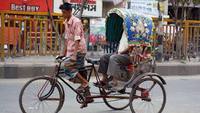-
Posted by
Hasina Akhtar Nigar February 21, 2019 -
Filed in
Arts & Culture
-
##rickshaw
-
3,116 views
Our eco vehicle-Rickshaw
Writer - Hasina Akhtar Nigar
If the world ranked the green cars, then our beloved Rikshaw would definitely be there. There are no artificial energies used to operate this vehicle. All it takes is just one man.
Rickshaw is a very simple machine. It is like a large tricycle with seats that can house two to three adult passengers. It is run by one man. And he is expected to be very strong, able to endure the harsh summers and rough monsoons of Bangladesh. He has to be strong enough to pull the passengers through rough roads and at times uphill in several bridges.
The Rickshaw is easy to build and maintain but also very easyily destroyed in an accident. During rains there is a small roof that is held up by hooks and a plastic blanket to cover the legs of the passengers. The Rickshaw driver can wear a raincoat if he wants to or in many cases if he can afford to.
Rikshaws are one of the most recognizable vehicles in the cities of Bangladesh. Its cousin ‘the van’ is widely used throughout the rural areas. These radical vehicles have inhabited the roads of Bangladesh since the country’s inception. They have ferrying people across towns, streets, villages, hamlets and other settlements for decades. Even modern roads of Dhaka after the advent of public bus, CNGs, taxis and Easy bikes over 30 percent of the residents use the rickshaw to travel. Many people, like students and local shop owners even use it as their primary mode of transportation. During strikes and riots Rickshaws are also used. And they are also available during festivals. Sometimes people ride them just to get a breath of fresh air. They are also very popular transport for couples in Universities and Colleges.
Rickshaw is also one of the primary sources of Dhaka’s frequent traffic jams. But there have been traffic jams in the highways as well as of late. So the Rickshaw alone cannot be held responsible.
Rickshawalas generally tend to be ill tempered and rude and often times completely disregard traffic rules. They are not to be blamed though. Most of them are illiterate and even can’t spell Rickshaw. There are some Rickshawalas that try to squeeze every bit of penny they can out of the passengers. But can they be totally blamed? Not at all. There is a saying in Bangla, “Scarcity leads to immorality.”
The rickshaw has been one of the primary sources of earning of many people in the lower working class. A man gets his yearly income out of this simple three wheeled transport. The Rickshaw industry has reportedly, daily revenue of 20 crores. But it is sad that many of the Rickshaw drivers (Rickshawalas as they are known in Bangladesh) are struggling for the basic standards of living. They are being manipulated by the heads of the Rickshaw industry. And if they try to protest they are discreetly and viciously put down. The government does take actions from time to time. But it’s just to fill their own greedy pockets or to earn votes for the next election and at times their actions do more harm than good.
Sheikh Hasina upon her rise to power in the last election has promised the population of Bangladesh that she will lead our country to the digital age. And whether our beloved eco vehicle remains on the road ahead remains to be seen.

